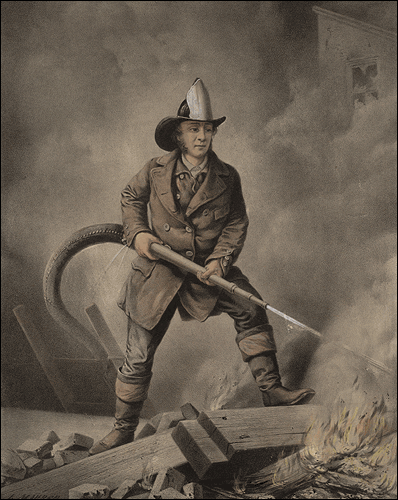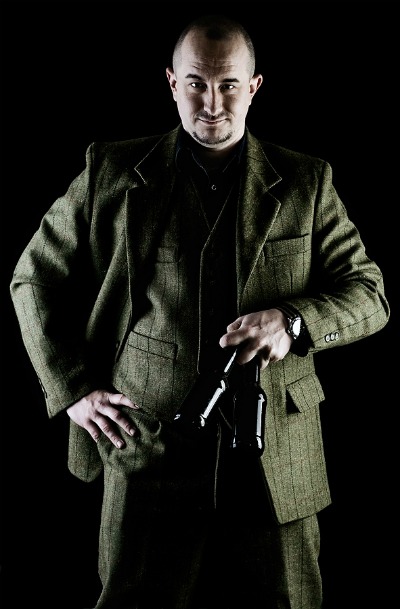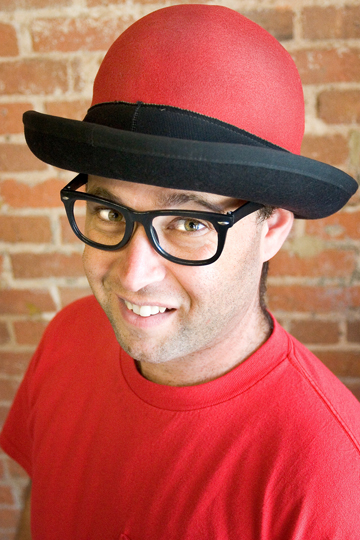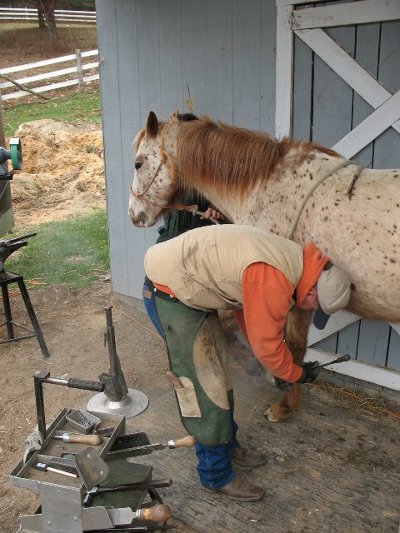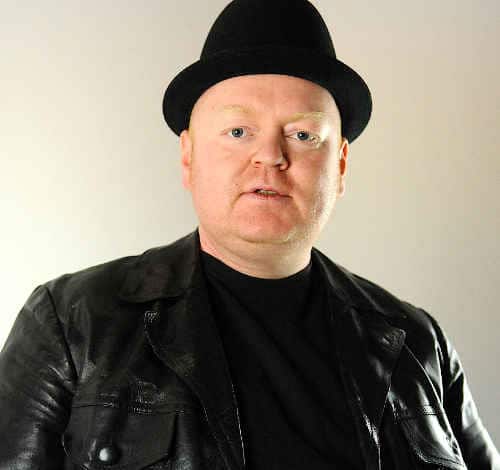
Once again we return to our So You Want My Job series, in which we interview men who are employed in desirable jobs and ask them about the reality of their work and for advice on how men can live their dream.
Today we have an awesome interview with Edward Mitchell. Mr. Mitchell’s job has two incredibly desirable elements-1) He’s a freelance writer, and 2) He writes about guitars and rock n’ roll. Edward writes for Total Guitar Magazine and runs the blog, Fix Your Own Damn Guitar. In this thoroughly enjoyable interview, Edward shares interesting anecdotes on how he got to where he is and some excellent tips for other aspiring writers. Thanks, Edward!
1. Tell us a little about yourself (Where are you from? How old are you? Where did you go to school? Describe your job and how long you’ve been at it, etc).
I live in a small town in Scotland called Linlithgow. It’s located about halfway between Glasgow and Edinburgh. If you’re already imagining a Mel Gibson look-a-like cowering on a windswept hillside, wrapped in a sheep carcass… you’ve seen Braveheart one too many times. I’m 39, married to Julie and I don’t look anything like Mel Gibson.
I’ve been writing professionally for eight years. File me under ‘late starter.’ I mainly freelance for guitar magazines, writing features on artists and instrument manufacturers. I also have a monthly guitar maintenance column called Ed’s Shed in UK magazine, Total Guitar.
As for education, my family moved around a lot when I was a kid thanks to my father’s job as a soldier in the British Army. As a result I attended a bunch of different schools in Germany, England and Scotland. The only subject I was good at was English. I loved to write from an early age. If there was a project that involved writing a story or poem on behalf of the whole class, it always fell to me to do the job.
I eventually left school without any formal qualifications. I suppose I would be more embarrassed about that if things hadn’t worked out so well. I’d never enjoyed school life but I lost interest completely when I discovered music in my early teens. I was just biding my time until I could leave. When my father spotted a job for an apprentice at a music store in Glasgow, I aced the interview and school was history for this laddie.
2. Why did you want to become a freelance writer? When did you know it was what you wanted to do?
I got married. Not only was tying the knot the best day of my life, it forced me to take a long hard look at myself. I’d been working in the music store for 17 years. I had worked my way up from tea boy and general dogsbody to the big cheese’s second in command. I was earning damn good money, but I wasn’t happy. My better half, Julie, was building a great career in marketing, and I felt like I was letting the side down a bit. Did I really want to be stuck behind a shop counter for the rest of my working life? It was a rhetorical question, easily answered…
While walking one Sunday afternoon with Julie, I told her how unhappy at work I had become. I felt I was wasting my potential and if I was going to make a career change, I had to do it soon. I’d wanted to be a rock star but got realistic about that when I hit my 30s. She asked me what I wanted to do. I said I’d always wanted to be a writer. Julie said ‘go for it.’ She would support any decision I made. She always has, bless her.
I saw a position advertised in a music trade magazine. The job was for a staff writer in that same magazine. Taking it would mean giving up a steady job, moving 500 miles to England and taking a big cut in pay. It would also mean living apart from Julie for three months while she organised the sale of our house in Scotland. We talked it through. It was a great opportunity to learn my craft. I would be a professional writer. More importantly, I would be surrounded by seasoned journalists. These guys would soon let me know if I had what it took to cut it in their world. It was a bold move.
The job was a baptism of fire. Expecting a plush office, I instead found myself crammed into a tiny attic space with two other journalists, both heavy smokers. Great… I don’t smoke. There was also no air conditioning. The heat in the summer was unbearable. I went home each night drenched in sweat, reeking of cigarettes.
I was beginning to think that I’d made a big mistake when something interesting happened. The magazine’s editor liked my work. Without any prior experience or training, I was cutting it. I learned to write copy fast; to chase down juicy news stories; I nailed the art of turning a two paragraph press release into an 800 word feature. I became part of a team that often had to put an issue together in nine days. I regularly worked from 8am to 4am the following day… and would have to turn up for work at 8am that same day. Fun. But I learned from the best in the most intense six months of my life.
After those first six months I got an opportunity to work as a reviews editor on Total Guitar magazine. It was, and remains, the biggest selling guitar title in the UK and Europe. It sells well in the US too. I took over the reviews section and set about improving it. I got rid of some existing freelance reviewers, some because they didn’t ‘get’ the magazine’s demographic, others simply because their writing wasn’t up to scratch. I took on some new contributors, great writers that raised the bar for musical instrument reviews. I became part of a great team. Total Guitar is about to celebrate its 200th issue. I’m proud of the fact that I’ve contributed to the last 85 of those issues.
It was while at Total Guitar that I began the Ed’s Shed guitar maintenance column to teach novices how to maintain, service and repair their own equipment. I wanted to save them money and allow them to fix problems fast instead of relying on someone else. The column has been a huge success. I also write cover features and ‘how to’ guides for the magazine.
3. If a man wishes to become a freelance writer, how should he best prepare? Is getting a degree in journalism or writing worthwhile? How do you go about breaking into the business and getting your work published?
Although I haven’t gone down that road myself, I think a degree in writing or journalism is absolutely worthwhile. I doubted my own abilities for so long because I had no formal training or qualifications to back up my work. Perhaps I’ll look at getting a degree in the future. Even now, I torture myself a little when I’m putting some copy together. I’ll write a feature a few times over before I’ll admit to being happy with it. Sometimes I think about it for days, then write through the night when the inspiration finally hits. Some stories are easier to write than others. That’s part of the deal with this job. You have to put the work in to produce something you can be proud of. If I’m honest, I still doubt my abilities these days. I temper that with this golden rule: If no one says that you’re messing things up… then you’re not messing things up.
Breaking into the business is the tough part. There are a lot of writers out there. That said, if you’re good at what you do, you’ll make it. Target those publications that deal with subjects that you are interested in; subjects that you actually know something about. Don’t try to fake it. A good editor will spot a bogus writer straight away. My main expertise is in the history of rock ‘n’ roll and guitars. I’m also good on vintage cars. I’ll leave landscape gardening tips and motorcycle maintenance to writers that know about that stuff.
4. How do you market yourself? Do you have any tips on consistently getting your writing published?
Inspired by the positive response from readers to my monthly Ed’s Shed column in Total Guitar, I’ve just started my own blog. Called Fix Your Own Damn Guitar, it’s a showcase for my magazine work and a journal of the development of my guitar maintenance website. It will also have some stories about my life as a music store worker, some of which are quite bizarre. Ed’s Shed is about to run in US magazine Guitar World which has a monthly readership of about 250,000. I’m hoping the blog will lead to a successful website and more writing opportunities.
Aspiring writers should consider writing some copy for free. You have to get your name out there. A few years ago I emailed the editor at an American publication called Rockabilly Magazine. The guy was interested in my work but couldn’t pay for any copy. I decided the exposure was worth my time and effort, and I began submitting articles. Rockabilly music is a passion of mine so I enjoyed putting the features together. Writing for fun keeps your work fresh… and you’ll be exposed to a whole new set of readers. It doesn’t always have to be about the Benjamin’s…
If you give the magazine what they want, if your copy is consistently good, they will keep giving you work. Simple as that. Once you’re in, don’t be afraid to suggest feature ideas. Most editors will appreciate your enthusiasm.
5. How difficult is it to make a living as a freelance writer? Do many writers have other jobs or sources of income on the side?
It can be a tough way to make a living. Some people do get enough work to make it their only job, but most of the freelance writers I know have other sources of income. I run a business importing electric guitars, now that I am back living in Scotland. I still call myself a writer because in my heart that is what I am. With a bit more hustling, I hope to be a full-time freelancer, writing interesting articles for magazines like Esquire. I’m also working on some ideas for television with a writing partner. That’s the dream.
The great thing about freelance writing is that you can do it even if you have a day job. That way you can learn your craft without compromising your living standards. If that sounds like a cop out, it’s not. It’s called being smart.
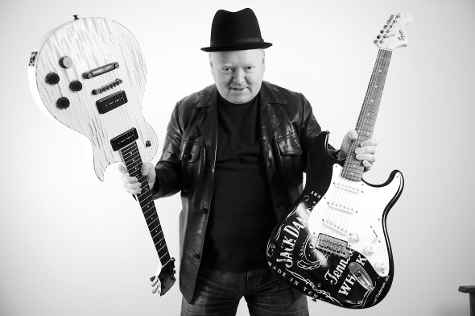
6. What is the best part of your job?
I still get excited when I see my name in print! I don’t think I’ll ever get tired of that. I’ve also ‘met’ most of my heroes. My job often involves chatting with rock stars, sometimes face to face, sometimes on the phone. I’ve interviewed over 70 guitarists over the past five years from the likes of Joe Perry of Aerosmith to pioneers like the late, great Les Paul.
I’ve downed a few Budweisers with the Dropkick Murphys, tried (and failed) to get a word in edgewise with George Thorogood and chatted to Sonny Curtis of The Crickets about the day he wrote “I Fought The Law.” I’ve had a laugh with Bon Jovi’s Richie Sambora (his definition of the word ‘wanking’ was very different from the British interpretation). I’ll also never forget my conversation with Bob Wootton, the man who played guitar for Johnny Cash. That was a real career highlight… for me I mean. Perhaps not so much for Bob!
The job can also involve a bit of travel. On one occasion I was asked to fly to LA to interview Ozzy Osbourne and his guitarist Zakk Wylde. A two-day visit turned into six when Ozzy missed his flight. While I waited for confirmation of the time and location of the interview I blasted round Hollywood in a rented Dodge Charger and ran up a bill at the Beverly Hilton. My wife and I vacation in the States twice a year so I wasn’t too put out by Ozzy’s tardiness. When the interview finally happened the first thing Zakk Wylde said to me was ‘Hey man, have you still got that 14-inch cock?’ I’d never met him before. I just nodded my head and said ‘ah, my reputation precedes me’. What was I supposed to say? No? I knew the feature was going to be great from that point on. It practically wrote itself.
I still get a tingle of excitement before I do an interview. If you ever get complacent about picking up a phone and hearing a voice say, ‘Hi, this is Jimmy Page,’ well, this job isn’t for you…
7. What is the worst part of your job?
Writer’s block is a bitch. Most writers experience it at some point. I’ve had my fair share. There’s nothing more terrifying to a writer on a deadline than staring at a blank computer screen waiting for inspiration to strike. It’s mental constipation. In my experience there are two ways to deal with it: write down anything you can think of relating to your subject, then look for that killer first or last line. The rest of the piece will follow. The second method is to simply walk away and come back to it later. That does help. A looming deadline is also a good motivator.
The other worst part of the job is that, in a sense, real rock ‘n’ roll journalism is dead. There’s so much money tied up in the music industry these days that record companies and PR people won’t risk their artist’s public image. Positive spin is the name of the game. The days when rock writers like Lester Bangs and Steven Rosen would go on the road with a band, and live the rock ‘n’ roll lifestyle themselves, are pretty much over. These days you’re more likely to get a 30 minute ‘phoner’ with an artist. I’ve had anything from a 13-minute chat with Mötley Crüe bassist Nikki Sixx – I had to turn that into a 1,400 word feature – to an hour and a half with Aerosmith’s Joe Perry. The time you’re alloted can vary a lot.
8. What’s the work/family/life balance like?
Unless you’re doing a lot of travelling, freelance writing shouldn’t negatively affect your family life. If you’re on a tight deadline you might find yourself typing through a few late nights but that’s about it. I find that I need total peace and quiet to write, so late nights work best.
My wife Julie encourages my writing. I read most of my work to her to make sure that it flows well and makes sense. Writing doesn’t have to be a lonely profession!
9. What is the biggest misconception people have about your job?
That it’s highly paid! Unless you’re a big name columnist or a novelist living off a fat advance, freelance writing is not a get rich quick scheme. Do it because you love it. There are easier ways to make money, but few are so satisfying.
10. Any other advice, tips, or anecdotes you’d like to share?
Develop your own voice and learn how to make it work on the page. There are rules that you must follow: good grammar is essential; your spelling better be spot on. Allowing your personality to shine through in a written piece is important too. We can’t all be Hunter S. Thompson or James Ellroy, but you can try to make your writing recognisably yours. That’s the element that makes people want to read what you’ve written… and look forward to reading your work again.
Know your subject inside out. Do your research. If you’re not sure about something, look it up. There’s no excuse for silly mistakes like misspelling someone’s name or getting an album title wrong.
When you approach an editor looking for work, don’t send any unsolicited material. Only send examples of your work when specifically requested to do so. Consider setting up a blog or website to showcase your work. It’s then ok to direct an editor to your site through an introductory email. If you are asked to submit copy, study the publication in detail. You want your work to fit the ‘style’ of the magazine. Every magazine is different so don’t assume that the way you write will work for every publisher. Put the time in and get it right.
Finally, and in many ways most importantly, there are a couple of things that I always consider when I write. I keep it simple and I always think about the reader.
In my opinion, bad writers try to show off with big words. If you don’t use a word in everyday life, don’t write it down. It’s that simple. Letting your ego get in the way of a good story will get you canned from any decent magazine. I’ve seen too many CD reviews where the writer had spent so much time showing off that it was impossible to tell whether they had actually enjoyed the music or not. That’s unforgivable. Simplify your work. Go through it and take out unnecessary words or whole sentences. The final draft will flow better.
Remember that someone is going to be reading your work. Think about them. Who are they? What knowledge will they have of your subject matter? If you’re writing about The Beatles, The Munsters or 50s ‘Lead Sleds’ and your readership is predominantly young, don’t assume they know everything that you do. You have a responsibility to guide them through the story. If you don’t, they’ll lose interest in what you’re trying to say. Speaking of which, I hope I’ve done my job well here… and you’ve made it to the end of this interview!
Tags: So You Want My Job


